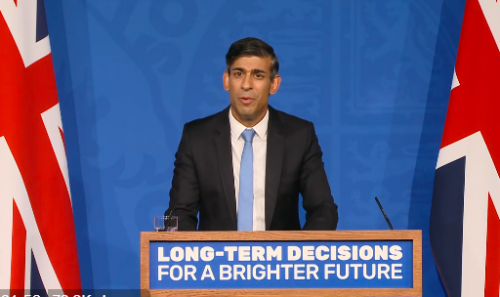Sunak’s net zero U-turn met with derision from business leaders and unions

Prime Minister Rishi Sunak’s plan to substantially water down the UK’s commitment to become net zero has been met with a hail of criticism from business leaders, environmentalists and academics.
In a keynote speech yesterday (September 20), Sunak said he pushing back the ban on new cars using solely petrol and diesel from 2030 until 2035, loosening plans to phase out gas boilers from 2035, delaying the ban on boilers that rely on oil from 2026 to 2035 and scrapping entirely the energy efficiency upgrades to homes – in a move that will be seen as a boost to landlords.
He said: “We’re changing the way we reach net zero by 2050 to ease the burden on working people. Our new approach will be pragmatic, proportionate and realistic.”
But Northern business leaders expressed outrage at the uncertainty his statement has caused.
Professor Juergen Maier, vice-chair of the Northern Powerhouse Partnership, said the uncertainty would discourage investment. “The North of England is at the forefront of the net zero transition, whether it’s making blades for wind turbines in Hull or rolling out carbon capture and storage technology on the Tees and Mersey. This is at the heart of our five-point plan to transform the Northern economy,” he said.
“The uncertainty created for our car and broader green industries today will disincentivise investment, will slow our path to net-zero and reduce the opportunities for well-paid green jobs in the north.
“While we welcome the additional support for heat pump roll out, we’re still lagging behind our neighbours across Europe in this respect.
“We await more news on key industrial areas that were not mentioned in today’s speech, especially progress on Track 2 Carbon Capture schemes in order to protect oil refinery and power station jobs across Scotland and the North.”
Ged Barlow, chief executive of Net Zero North West said: “This latest announcement by the Government is disappointing, especially as so much progress has been made in terms of insight, plans and capabilities to deliver and significantly beat Net Zero targets in the UK, thanks to business steering groups like ours, here at Net Zero North West.
“We stand firm as a group in our agreement that it is vital Net Zero is an absolute priority for our country to push forward, rather than slow down. What also concerns us is the new target increases uncertainty in industry around potential changes to other industrial targets, which is also disappointing.”
Professor Ken McPhail, head of Alliance Manchester Business School, said: “Framing net zero as a cost is wrong. It’s an opportunity for economic growth, decent work and foreign direct investment (FDI). Greater Manchester’s economic strategy recognises this opportunity, and the combined health and economic benefits for the city.
“A stable policy horizon is crucial for investment. Many businesses have already made long-term decisions based on predicted changes in consumer behaviour. The worry is that the UK will not attract the FDI associated with EV development and energy transition. Weakening targets also risks stifling entrepreneurial and start-up activity that is critical to the innovation ecosystems that drive economic growth.
“There is also a real sense of policy incoherence, and mixed messages on the skills agenda. Less than a fortnight ago, the UKRI awarded £5.8m to projects that are manufacturing technologies in the drive to net zero. We’re seeing a huge demand for skills in business transformation. The question is whether this talent will go overseas to pursue careers instead.”
Transport and travel union TSSA has warned the government is “heading down a climate cul de sac” after Sunak announced “a new approach” to tackling climate change.
The remarks come just days after questions in the Commons in response to reports that the government plans to scrap the High Speed 2 (HS2) rail line beyond Birmingham, to Manchester – a key green mass transport project.
TSSA interim general secretary Peter Pendle said: “What we have heard from the Prime Minister is a dereliction of duty which sends our country down a climate cul de sac.
“Rishi Sunak has no mandate to turn away from existing climate change obligations. If he wishes to press ahead with such major changes he should have the guts to call a general election so the public has a proper say.
“Our union fights every day to help secure Britain’s transition to net zero. Our railways are at the forefront of that change as the most important mass green transport system.
“If Sunak is serious he would give a clear commitment that HS2 will be built in full. That would be a major step forward down the road to net zero.”
And not even all organisations representing landlords have welcomed the changes.
Jonathan Daines, Founder and CEO, lettingaproperty.com said: “While welcome news for some, the Government’s U-turn on introducing new energy efficiency regulations on homes is frustrating for our landlord clients, many of whom have already taken steps to ‘do the right thing’ in preparation for change.
“With the planned EPC changes looming, many landlords in our community proactively improved the energy efficiency of their properties. They incurred significant costs and practical hassles, to make energy efficiency upgrades in line with proposed EPC minimums.
“Some of our landlords even took the drastic step of selling their property because it was financially or practically impossible to make necessary improvements. These landlords have walked away from the Private Rented Sector and a ripple effect has been felt, with tenants competing within a shrinking pool of homes to rent. Those lucky enough to secure a rental are typically paying more for the privilege, thanks to reduced stock levels – an unwelcome burden on top of rising living costs.
“Letting agents too have felt the pain of Government indecision. With many landlords choosing to exit the market, potential customer numbers have decreased, leading to increased competition combined with rising acquisition and retention costs.
“Amid the chaos, we mustn’t lose site of the positive purpose behind making energy efficiency improvements and creating greener homes to support the wider commitment to net zero. It is imperative however that policymakers provide clarity and consistency in their approach to rental property regulations. The Government’s wavering stance has ultimately betrayed landlords and tenants, while negatively impacting businesses who rely on a stable and thriving rental market.”
However, Babs Murphy, chief executive of North and Western Lancashire Chamber of Commerce, seemed to welcome to extra time businesses have to prepare: “A phased approach to implementing the ban on petrol and diesel vehicles and phasing out gas boilers will provide businesses with a smoother transition period. This will enable them to gradually adapt and find sustainable alternatives without incurring excessive costs or facing supply shortages.
“This delay will also give businesses the chance to assess the potential impact on their operations and make any necessary adjustments to minimise disruption.
“However, it is important for the government to provide clarity and certainty regarding the revised timelines for these green pledges. Businesses need clear direction and sufficient time to make the necessary preparations, and any delays should not be open-ended or indefinite. The government should communicate a clear roadmap with achievable milestones to ensure that businesses can effectively plan and allocate resources.
“Overall, a delay in the government’s green agenda can be seen as an opportunity for businesses to adequately prepare and plan for the necessary changes. However, it is crucial that the government provides clarity and sets realistic deadlines to enable businesses to effectively evolve to greener alternatives.”








